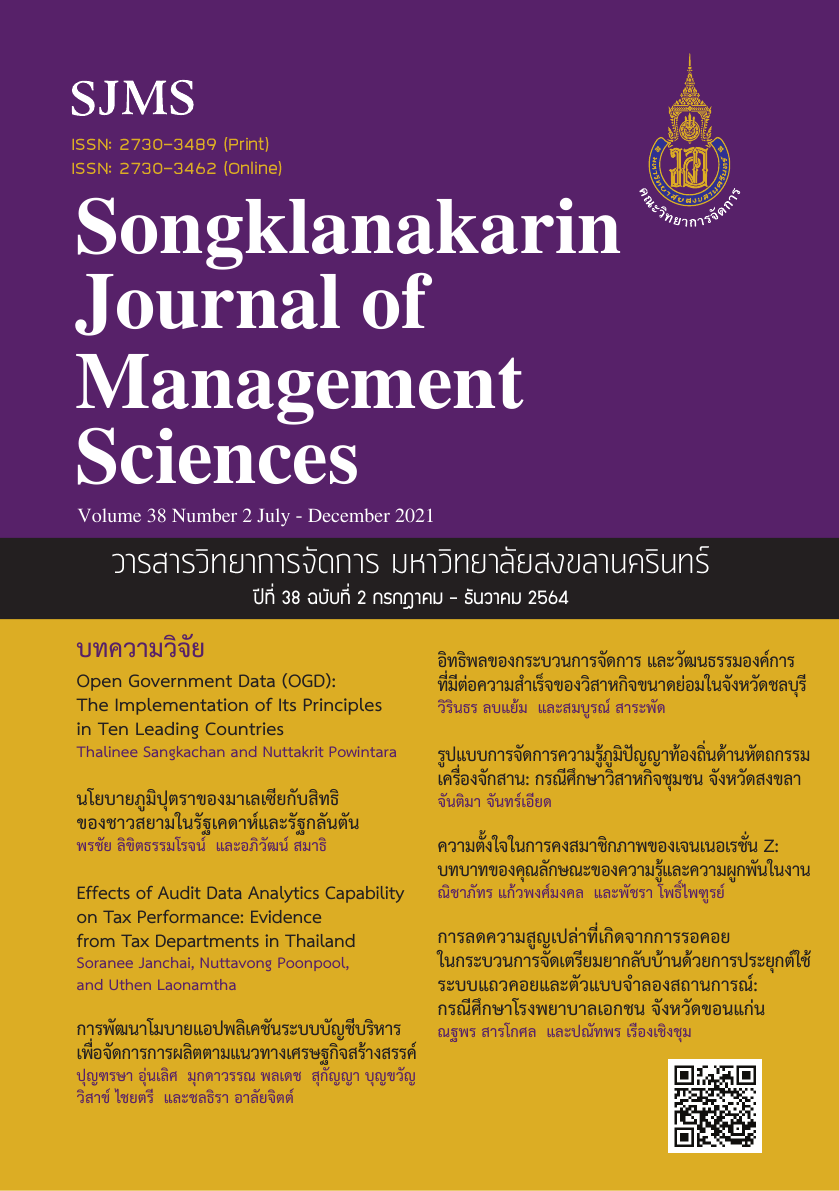A Model of Knowledge Management of Local Wisdom for Wicker Craftsmanship: A Case Study of Songkhla Community Enterprise
Main Article Content
Abstract
This research aimed to investigate patterns, processes, and key to success factors of knowledge management of local wisdom in wicker handicrafts of six community enterprises. The key informants included one senior or a community philosopher, a chairman of each community enterprise as well as seven wicker handicrafts entrepreneurs with at least five years of experience from each community enterprise. Thus, the total key informants were fifty four people. The in-depth interviewed was employed with these purposively selected respondents. The results revealed that the knowledge management model of local wisdom in wicker handicrafts consisted of two characteristics: (1) a traditional local wisdom knowledge and (2) new knowledge that applied from local wisdom. For the knowledge management process, it was found that there were 5 steps which are: (1) Knowledge determination: knowledge that bring from ancestors to formulate products through group members' collective thinking and decisions, (2) knowledge acquisition and adherence: knowledge which constructs from both within the group and outside to increase the group knowledge, (3) knowledge sharing: the exchange of knowledge within the group to give the group members more knowledge and production skills, (4) knowledge storing: an individual remembered by practicing and (5) knowledge transfer from person to person by demonstration. For the key to success factors of knowledge management, it was found that the group members had open-minded to accepting new things, and faith in the group leader. The finding of this research was the “self-reliance” of the community enterprises that produce wicker which arose from mutual learning. Moreover, the villagers in the community were more valued and used the group members’ local wisdoms handicrafts products which led to the expansion of sustainable participation of community enterprises.
Article Details

This work is licensed under a Creative Commons Attribution-NonCommercial-NoDerivatives 4.0 International License.
All published articles are SJMS’s copyright. The editorial board allows all published articles to be copied, excerpted, or disseminated with academic citation.
References
Arthur, A., Productivity, A., & Center, Q. (1996). The Knowledge Management Assessment Tool: External Benchmarking Version. Retrieved 5 June, 2019, from https://sais.aisnet.org/BartczakEtAl.php.
Dalkir, K. (2005). Knowledge Management in Theory and Practice. Burlington, MA: Elsevier Butterworth-Heinemann.
Duanguppama, S., & Pharnak, P. (2013). Transfer of Local Wisdom on Suea KoK (Reed Mat) Weaving. Journal of Community Development and Life Quality. Faculty of Agriculture Chiangmai University, 1(3), 195-203.
Katusukhavadee, S. (2009). The Local Wisdom Transmission of Folk Handicraft : Case Study of Ban Nong-hiang, Phanut Nikhom District, Chonburi Province. Thesis Master of Arts (Thai Studies). Dhonburi Rajabhat University.
Kongthong, A. (2010). Role model for basketry career development In Phanat-nikhom, Chonburi. Thesis Master of Public Administration Program in Local Government. Khon Kaen University.
Manowang, J., Sapa, w., & Lahuna, T. (2018). Development of Wicker toward the Community Standards in Dong Mada Sub-district, Mae Lao District, Chiang Rai Province. Proceeding of the 13th Naresuan Research Conference, (pp. 926-936).
Manowang, J., & Sepha, W. (2020). Development of the Traditional Handicrafts Wisdom of the Elderly to Enter to the Standard of Wiang Nuea Sub-District, Wiangchai District, Chiang Rai Province. Journal of Community Development Research (Humanities and Social Sciences), 13(1), 128-140.
Marquardt, M. (1996). Building the Learning Organization. New York: McGraw-Hill.
Mertins, K., Heisig, P., & Vorbeck, J. (2003). Knowledge Management: Concepts and Best Practices. 2nd ed. New York: Springer.
National Productivity Institute. (2004). Knowledge Management form theory to practice. Bangkok: Jirawat Express.
Office of the National Culture Commission. (1990). Seminar Report Academic on folk wisdom. Bangkok: ThaiPublica.
Patcharametha, T. (2016). Handicraft products and the development into the OTOP products. Faculty of Fine Arts and Architecture Rajamangala University of Technology Lanna. University journal Fine arts, 36(1), 67-80.
Pootes, U. (2017). Process of Transferring Local Wisdom Wicker in Ban Dongchapu, Bang Maplor Sub-District, Krok Phok Phra District, Nakhon Sawan Province. Journal Social Science, MCU, 6(4), 180-188.
Puongngam, K. (2010). Community and Local Self Government. Bangkok: Borpit-Printing.
Rattanabhoca, J. (2008). Developing of knowledge management model for a handicraft Competency - Based curriculum By Thai Wisdom. Thesis Ph.D. King Mongkut’s King Mongkut’s University of Technology North Bangkok.
Rien Saowapak, S., Akharabawon, J., & Kaewpichit, J. (2005). Knowledge Management. Bangkok: Administrative System Development Group, Office of the Public Sector Development Commission.
Somprajob, P. (2014). Phuen Basketry Handicraft : Knowledge Management Model of Local Wisdom for Local Art and Culture Identity Value by Community Participation. Rajamangala University of Technology Thanyaburi Faculty of Liberal Arts.
Songkhla Community Enterprise. (2020). Community Enterprise Group. Retrieved 18 June, 2020, from https://smce.doae.go.th/ProductCategory/SmceCategory.php
Tabaselo, P. (2017). The Community Sustainable Development: The Correlation between the Sufficiency Economy Community and the Sila 5 village in Ubonratchathani, Sisaket, Buriram and Surin. Journal of MCU Peace Studies, 6(1), 117-128.
Thongruang, P., Lertgrai, P., & Noothongkeaw, K. (2016). The Community Model for. Sustainable learning. Narkbhut Paritat Journal Nakhon Si Thammarat Rajabhat University, 9(2), 192-205.
Varavitpinit, S., Boonkoum, W., & Sungrugsa, N. (2017).The Model Development of Phetchburi city follows philosophy trend of the sufficient economy. Veridian E-Journal Silpakorn University, 10(2), 1657-1674.
Watcharakiettisak, T. (2016). Community economic strengthening by developing community enterprise group at tambonpol songkram administration organization Nonsung District, NakhonRatchasima Province. Journal of Business Administration, 5(1), 43-54.
Wiig, K. (1993). Knowledge Management Foundations. Thinking About Thinking-How Organizations Create, Represent and Use Knowledge. Arlington, TX: Scherma Press.

